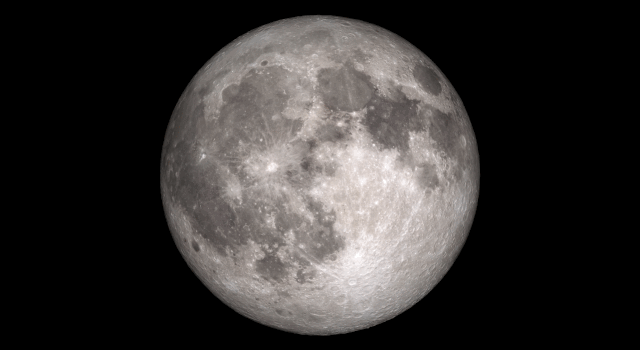Don't miss this weekend's total lunar eclipse. Sky watchers throughout North America will be able to see the Moon pass through Earth's shadow starting at 9:32 p.m. EDT on Sunday, May 15. Totality will begin at 11:29 p.m. EDT and last for almost 90 minutes. Click here to get full timeline details.
Looking for even more Moon-related resources? Check out this list of STEM activities and stories from the Lunar and Planetary Institute. | | Audience: Educators, Parents, Caregivers, and Students Event Date: May 14 at 11 a.m. EDT To celebrate the upcoming Artemis I launch, the Lunar and Planetary Institute is hosting a special program about rocket science. This free virtual presentation is designed for families and children. Attendees will hear from NASA rocket scientists, learn about new missions to space, and explore resources to build their own rocket at home. | | professional development hours. | | Audience: K-12 Educators Event Date: May 17 at 7 p.m. EDT Students find astrobiology motivating, relevant, and exciting. Teachers like that astrobiology is interdisciplinary – using skills and knowledge from all branches of science, math, and engineering – and connects beautifully with art and writing. How can you learn more, get support, and find the resources you need to bring this amazing content to your students?
Join us at this no-cost virtual session to explore the support and resources you can use to create exciting opportunities for students. | | Audience: Formal and Informal Educators, Parents, and Caregivers Webinar Date: May 19 at 2 p.m. EDT Join the GLOBE (Global Learning and Observations to Benefit the Environment) program for a professional development webinar for educators and citizen scientists. Dr. Rusty Low from the Institute for Global Environmental Strategies and co-presenter Dani Hostin from the Federal University of Paraná in Brazil will share experiences with the Zika Bus. Plus, participants will learn how to use data from NASA’s Global Precipitation Measurement mission in their own mosquito projects. Click here to register to attend. | | Audience: All Ages Event Date: May 19 at 6:30 p.m. EDT What is it like being an engineer helping scientists make discoveries about our solar system? Often challenging, sometimes hair-raising, occasionally mind-blowing… and always deeply rewarding. Join Dr. Tracy Drain to hear about her path to becoming a systems engineer working on deep space missions for NASA. Get a behind-the-scenes glimpse of her work on the Juno mission (in orbit around Jupiter since 2016) and the upcoming Europa Clipper mission that is heading back to the Jovian neighborhood – but this time to study an ice-shelled, water-rich moon. | | Audience: Undergraduate STEM Students Application Deadline: May 15 The NASA Lucy Student Pathway Accelerator and Competency Enabler (L'SPACE) Academy is a free, online, interactive program for students interested in pursuing a career with NASA or other space organizations. L'SPACE consists of two academies – the Mission Concept Academy and the NASA Proposal Writing and Evaluation Experience Academy. Students may participate in one academy per semester. Each 12-week academy is designed to provide unique, hands-on learning and insight into the dynamic world of the space industry. Students can expect to learn NASA mission procedures and protocols from industry professionals as they collaborate with fellow team members to complete mission-related team projects. | | Audience: Amateur Astronomers of All Ages Entry Deadline: July 31
Join NASA's Universe of Learning for an exciting opportunity to use real astronomical data and tools to create your own images of the eruptive star system Eta Carinae, and the dusty nebula in which it resides – the Carina Nebula.
Capture your own real-time telescope image of the Carina Nebula using the MicroObservatory robotic telescope network, NASA space telescope missions (Chandra and Spitzer), and the ground-based NOIRLab’s Curtis Schmidt Telescope. You can also work with an archived set of data files of Eta Carinae, taken with two multiwavelength NASA space telescope missions (Hubble and Chandra) and ground-based observations from Carnegie's Magellan Telescope.
| | Audience: Minority-Serving Institutions Proposal Deadline: May 23 NASA is seeking proposals for planning grants in support of the Minority University Research and Education Project (MUREP) administered by NASA’s Office of STEM Engagement. Proposals are being accepted for the MUREP Small Business Technology Transfer Research (M-STTR) Planning Grants activity. M-STTR seeks to reduce barriers faced by Minority-Serving Institutions and small businesses by maximizing the potential for long-term collaborations and enhancing opportunities. These efforts will develop mutually beneficial relationships that result in new technologies supporting the NASA mission and commercial market development. | | Opportunities With Our Partners | | | | | Application Deadline: June 3 | |
Are you looking for NASA STEM materials to support your curriculum?
Find NASA science resources for your classroom. NASA Wavelength is a digital collection of Earth and space science resources for educators of all levels — from elementary to college, to out-of-school programs. https://science.nasa.gov/learners/wavelength
Check out the ‘Explore NASA Science’ website! Science starts with questions, leading to discoveries. Visit science.nasa.gov. To view the site in Spanish, visit ciencia.nasa.gov. | | Visit NASA STEM Engagement on the Web: | | | | | | |
|



















